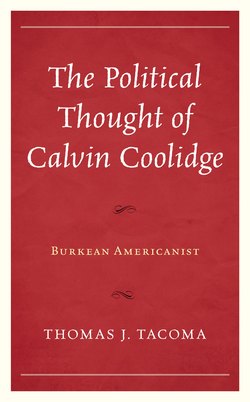Читать книгу The Political Thought of Calvin Coolidge - Thomas J. Tacoma - Страница 17
На сайте Литреса книга снята с продажи.
Social Darwinism
ОглавлениеA third key philosophic tradition contributing to the Progressive synthesis was social Darwinism. Darwin’s evolutionary theory transformed all social thought in America in the late nineteenth century, especially in the academic disciplines. While gradualist, developmental evolutionary thinking actually preceded Charles Darwin, and as a tool for interpreting social life was broader than Darwin’s ideas alone, the language of Darwinian evolution captured the minds of American scholars. The evolutionary theory’s explanatory power was such that Darwinian social categories remained influential well into the twentieth century. For this reason, Progressivism cannot be understood apart from social Darwinism.
At its heart, social Darwinism stood for the belief that human societies must be understood in the same way as the natural environment. Human society was organic; individuals exist, as animals do, as members of the natural world. The natural selection of the fittest members of the animal and plant kingdoms for survival had its parallel in human society: the fittest, the most competitive, human individuals succeed in the competition of life. The weakest perish, and the process improves the whole species. For the theorists of social Darwinism, the competitive processes of Nature must be allowed to work freely if the benefits of evolution are to accrue to the human species as a whole. State interference to aid the unfit and perishing could only lead to the weakening of the race. The scientific study of human society was possible, on this theory, but it was limited to the empirical, phenomenological world as understood within vast stretches of time.[32] For all of its purported conservatism (upholding the laissez-faire status quo), social Darwinism also attacked the traditional conceptions of truth and a static human nature. The American social Darwinist William Graham Sumner observed in 1909 that “there are no dogmatic propositions of political philosophy which are universally and always true; there are views which prevail, at a time, for a while, and then fade away and give place to other views.”[33] In this sense, social Darwinism too prepared the way for the Progressives to reject the old truths of the American regime.
Social Darwinism, as John G. West has argued, was both a philosophical defense of the policies of the political right and a scientific guide for the policies of the political left.[34] Certainly there were social Darwinists who supported the traditionally limited role of the government. Herbert Spencer, the leading philosopher of social Darwinism, was extremely popular in the United States between 1860 and 1880. Spencer wrote that “there cannot be more good done than that of letting social progress go on unhindered; yet an immensity of mischief may be done in the way of disturbing, and distorting and repressing, by policies carried out in pursuit of erroneous conceptions.”[35] However, social Darwinism was not simply a British phenomenon. Leading Americans drank deeply from Darwin’s well, appropriating his biological insights to other fields of human knowledge. William Graham Sumner, professor at Yale College in the latter half of the nineteenth century, promoted the adaptation of evolutionary biology to social matters in numerous popular articles, pamphlets, and academic works. Sumner attacked reform ideas for tampering with the natural course of human development. Real progress comes from the competition of individuals; reformers only disrupt the natural progress of the race.[36]
The social Darwinist influence extended to the political left as well. Contrary to the arguments of Hofstadter’s Social Darwinism in American Thought, most American businessmen supported ethical business practices on the basis of traditional Christian moral teaching.[37] The opponents of business—the reformers in academia, journalism, or politics—identified big business with social Darwinian philosophies. But these same reformers lived within horizons set by Darwin, and many of their proposed reforms reflected the influence of Darwinian biology. Such was the case, for example, in the “scientific” eugenicist movement. For these reformers, a flexible and evolving human nature could be progressively improved through selective breeding and sterilization programs, ultimately eradicating original sin and re-engineering human nature to be sound, intelligent, and strong. This was to be a scientifically guided human evolution.[38]
Social Darwinism mattered for the Progressives because it lent scientific credibility to many of the reforms they proposed. It had, moreover, saturated the environment in which they were trained, and it either taught or reinforced for them the new dogmas that truth was historically relative, that human nature was malleable and could be improved with time, and that the discoveries in the physical sciences could be used for the improvement of society.
